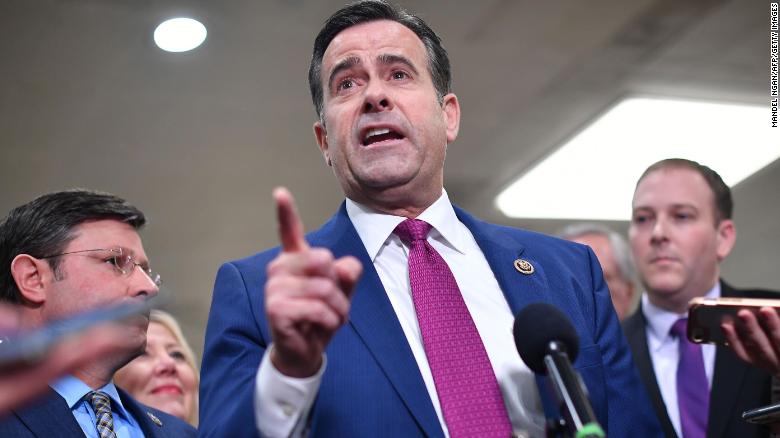Washington Director of National Intelligence John Ratcliffe declassified unverified Russian intelligence despite concerns being raised by the CIA and National Security Agency, according to people briefed on the matter.
Career officials in the intelligence agencies were concerned about declassifying the information because it was unverified and they believed it could reveal sources and methods. Ratcliffe overrode those concerns and sent the document to Senate Judiciary Chairman Lindsey Graham on Tuesday, the people said.
The declassified document, which includes a Russian intelligence assessment from 2016 that Hillary Clinton had approved a campaign plan to “stir up a scandal” against then-candidate Donald Trump by tying him to Russia and the hack of the Democratic National Committee, has sparked charges from Democrats that Ratcliffe was politicizing intelligence and sharing Russian disinformation.
It was the latest in a string of declassified documents Ratcliffe and Attorney General William Barr have provided to Senate Republicans and others targeting the FBI’s Russia investigation ahead of the November election.
Ratcliffe noted in the summary he provided to Graham that the intelligence community “does not know the accuracy of this allegation or the extent to which the Russian intelligence analysis may reflect exaggeration or fabrication.”
Ratcliffe later issued a clarifying statement that the information “is not Russian disinformation.” But multiple intelligence and law enforcement officials say the possibility that it is disinformation hasn’t been ruled out by the intelligence agencies.
After releasing the information on Tuesday, Ratcliffe quickly went up to Capitol Hill to brief Graham on the matter, according to two sources. Republican and Democratic Senate Intelligence Committee staff also took part in Tuesday’s briefing on the Russian intelligence.
But Democratic staffers for House Intelligence Chairman Adam Schiff and Sen. Dianne Feinstein, the Judiciary Committee’s top Democrat, were not allowed to join the briefing, according to two sources. Senate Judiciary Committee Republican staffers were also not allowed to participate.
Graham has cited the document at Wednesday’s hearing with former FBI Director James Comey, asking Comey if he investigated the matter. Comey said he didn’t know what Ratcliffe was referring to.
“I can’t answer that. I’ve read Mr. Ratcliffe’s letter, which frankly I’ve had trouble understanding,” Comey said.
Graham argued that he wasn’t concerned with whether the information was true or not, but argued that it showed the FBI didn’t investigate Clinton and Russia like they did Trump’s campaign.
“Apparently, this was just swept under the rug. And the point we’re trying to make here is there is a double standard, it’s obvious as night and day, and this is, if anything, the smoking gun,” Graham said.
Of course, the Russian intelligence involving Clinton that Graham referenced was unverified, while the FBI began investigating members of Trump’s campaign after the Australian ambassador told the FBI about his conversation with Trump campaign adviser George Papadopoulos, where the ambassador said Papadopoulos discussed Russia having dirt on Clinton.
Graham also said at Wednesday’s hearing he had not been privately briefed on the matter, despite his briefing with Ratcliffe on Tuesday.
The NSA declined to comment. The CIA referred a request to comment to the Office of the Director of National Intelligence.
Asked Tuesday if Ratcliffe declassified the information despite objections from officials at other intelligence agencies, ODNI responded by providing an on-the-record statement from Ratcliffe that did not directly address the issue but said the material was not Russian disinformation.
ODNI did not immediately respond to CNN’s follow-up request for comment Wednesday on whether CIA and NSA objected to the release.
>>>details


